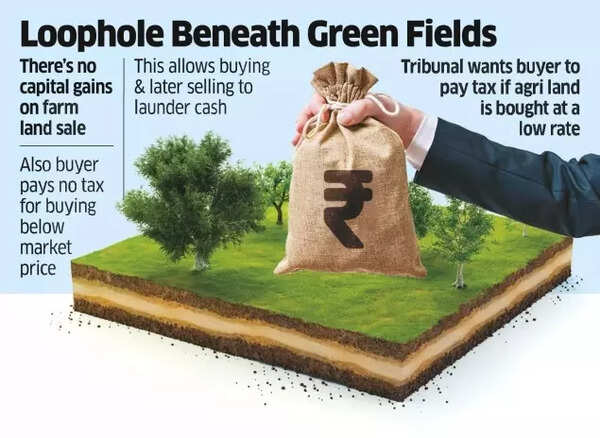Tax authorities are now scrutinising the often used practice of using agricultural land transactions to conceal unaccounted money. A recent verdict from the Income Tax Appellate Tribunal (ITAT) could potentially disrupt this established practice. According to an ET report, though the ITAT’s observations stem from a routine tax evasion case unrelated to these questionable transactions, its implications directly affect this property-based money conversion mechanism. ITAT, which functions as a quasi-judicial body, addresses disputes before they reach the High Court.How do these deals work?
- For instance: an individual with unexplained funds negotiates with a farmer to acquire land valued at ₹10 crore in the market.
- In this scenario, the land transaction shows an official value of ₹2 crore in documentation, whilst an additional ₹8 crore changes hands unofficially.
- The seller, typically a farmer exempt from tax monitoring by Income Tax authorities, readily accepts cash payment, which serves practical purposes like wages, agricultural inputs and other farming necessities.
- Subsequently, when this land is resold at its actual worth of ₹10 crore, the entire sum is processed through official banking channels, with proper documentation at market value.
- These sequential transactions enable the initial purchaser to legitimise ₹8 crore of undisclosed funds, representing the gap between ₹10 crore and ₹2 crore.
According to the report, for years, influential individuals including babus, entrepreneurs, political figures and entertainment personalities have employed this scheme of purchasing agricultural property at understated values through cash payments, later selling these at actual market prices through official channels to convert their undeclared wealth.

Tax Loophole
The mechanism works because agricultural land enjoys special status. Unlike urban property transactions, where buyers must pay tax on differences between market and transaction values, farm land purchases below ready reckoner rates attract no such levy.Also Read | ‘Biggest risk of my life’: Mukesh Ambani says even if Reliance Jio would have failed, it would have been ‘worth it’; told board ‘in worst case…’Furthermore, when the land is sold at ₹10 crore, its full value, no capital gains tax applies as agricultural land falls outside the scope of ‘capital asset’ classification.Farm land classified as ‘Immovable Asset’The Ahmedabad ITAT bench has confirmed the exemption of capital gains tax for farm land sales, whilst raising concerns about untaxed portions of the initial transaction (involving a ₹10 crore asset purchased for ₹2 crore).According to Section 56(2)(x) of the I-T Act, the difference between market value and transaction price of “immovable property” (and other assets) is fully taxable.In its May 27 judgement, the ITAT stated, “The term ‘immovable assets’ has not been defined in section 56(2)(x) or in any other section in the I-T Act. This renders the word to be used in general parlance. In general understanding of the term, the word ‘immovable asset’ means an asset which cannot be removed without destroying or altering it. Therefore, going by the general definition, ‘immovable property would, in our view, include any rural agricultural land, in absence of any specific exclusion in section 56(2)(x).“If the High Court endorses this interpretation, it would create significant obstacles for those attempting to utilise agricultural land transactions as a means of money laundering and undisclosed cash dealings.Also Read | ‘Top priority right now’: Amidst Air India crisis, Tata Group chairman N Chandrasekaran takes charge of day-to-day airline operationsAshish Karundia, founder of CA firm Ashish Karundia & Co, was quoted as saying: “It is a well-settled principle that the nature of income for the recipient does not necessarily depend on the nature of the source from which it is derived. Likewise, it is also recognized that the characterization of income arising from a transaction need not be the same between the parties involved. Based on this principle and considering that the difference between stamp duty value and actual transaction value is explicitly included as income, such difference can be taxed as income in the buyer’s hand, regardless of the land’s classification or the tax treatment in the seller’s hand.”“However, if it can be established that the difference in these values of agricultural land qualifies as income or revenue derived from agricultural land, it can be considered agricultural income. Once the income qualifies as agricultural income, tax cannot be levied since tax on agricultural income falls within the domain of the state legislature. It would, therefore, be very interesting to see how the higher courts interpret the nature of such a differential amount, especially given that agriculture is a state subject,” he said.

